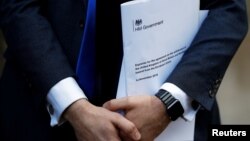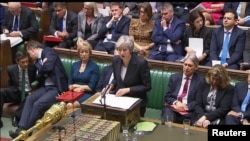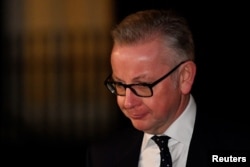Embattled British Prime Minister Theresa May came out fighting Friday in defense of her contentious draft Brexit deal, calling on the British public to back her. But critics within her party, who complain the proposed agreement would turn Britain into a “vassal state,” mounted a formal bid to oust her.
The proposed deal with the European Union, more than two years after Britons voted in a referendum to exit the bloc, has triggered half-a-dozen ministerial resignations.
It also prompted high drama in the House of Commons, where May received the most hostile reception a sitting prime minister has endured since 1940, when Neville Chamberlain was pushed out of office at the start of the Second World War.
The withdrawal deal has been pronounced “dead on arrival” by lawmakers across the political spectrum. They say the agreement won’t gain parliamentary backing in a planned vote next month. The deal would see Britain remaining in the EU’s customs union, which address imports and exports, for an indefinite period and subject to the bloc’s rules and regulations without having any say about them
May maintained during a radio interview Friday that she has negotiated the best deal possible, despite it crossing many "red lines" she had set previously. May and her loyalists say there is no alternative to the proposed withdrawal agreement that runs to 538 pages and took many months of tortuous negotiations to seal, because the alternatives are even more unpalatable for Britain or impossible to get the EU and its 27 member countries to accept.
May says the draft agreement is just a staging post, a temporary deal that’s in place while Britain negotiates over the next few years a fuller free trade deal with the bloc. Her supporters say it is no time for a change in leadership with just over four months to go before Britain is scheduled to leave the EU, deal or no deal.
“I am not sure any other prime minister could have done any better,” said Simon Hart, a Conservative lawmaker. “I will say one thing for the prime minister — you can never doubt her resilience and stoicism,” he added.
Partial relief
The prime minister got some relief Friday when a senior minister, Michael Gove, who had been rumored to be resigning to protest the draft deal, said he would be staying in the Cabinet.
It remains unclear, however, whether other prominent hardline Brexiters in May’s thinning Cabinet will follow Gove’s cue over the next few weeks and decide against tendering their resignations. So far, several other Brexiters in the Cabinet have indicated they will stay to work together to improve the deal. “Resigning and joining a rebellion is not going to help anything,” said one of their aides.
Whether their resolve will hold is another thing, if the internecine [destructive] rebellion against May gains momentum.
“Then they will have to consider how their choice plays out in any future leadership election they may want to compete in,” said a party official.
And talk of renegotiation is being rebuffed by EU officials, who on Friday cautioned that the agreement is the best they can do and there can be no changes.
“This is a good deal for both sides,” Austrian Chancellor Sebastian Kurz said Friday. “No one was tricked into anything,” said Kurz, whose country holds the EU's rotating presidency until the end of the year. He warned that the only alternative would be for Britain to leave the EU without any deal, which “would hurt Britain badly.”
Mounting leadership challenges
Gove’s decision not to resign didn’t stop more Conservative lawmakers from lodging formal letters with party authorities calling for a vote of no confidence in May as party leader, the first stage in a leadership challenge.
As May started her effort to sell the deal to the public, John Whittingdale, a Brexiter and former culture secretary, filed his letter, joining more than two dozen other Conservative rebels who have publicly called for her to step aside.
“I believe that the agreement that is being proposed does not deliver Brexit in the way that I and many others want to see. It leaves us locked in indefinitely into the customs union. I also don’t think it can get through the House of Commons,” he wrote.
May’s party critics accuse her of going from her oft-stated position that “no deal is better than a bad deal” to one where she appears to accept “any deal is better than no deal.”
“It is no good trying to pretend that the deal honors the result of the referendum when it is obvious to everyone it doesn’t,” said Esther McVey, who resigned this week as works and pension minister.
Time on May's side
Whether the deal honors what the majority of Britons voted for in June 2016 may be a moot point, say analysts. In trying to sell a deal that satisfies neither Brexiters, who want a sharp break with the EU, nor Remainers, who say staying as a member of the bloc is the only thing that won’t damage Britain, May, if she can see off the rebellion, has time on her side, they say.
She is banking on securing a majority next month for her deal when parliament is scheduled to vote formally on it, by daring lawmakers across the political spectrum — all the opposition parties have formally come out against the deal — to let a "no-deal Brexit" go ahead, likely triggering a recession and leaving behind it bankrupt businesses and ruined livelihoods.
The fear of quitting the EU without a deal seems to be persuading some lawmakers who dislike the agreement to accept they have no option but to back it.
“The most likely alternative is we leave the EU with no deal at all,” wrote Nicky Morgan, a former Conservative minister, in an article for The Guardian newspaper. “And I believe that would be deeply damaging to our economy and our constituents. I cannot sign up to that.”
Party officials, known as Whips, were mounting a feverish effort Friday to dissuade Conservative lawmakers from insisting on holding a no-confidence vote on May’s leadership. Their biggest fear is that if they are unable to do so before lawmakers head back to their constituencies, where the draft agreement is highly unpopular among grassroots Conservatives, then the prime minister will not be able to avoid a leadership challenge and the rebellion will gather steam, analysts say.











